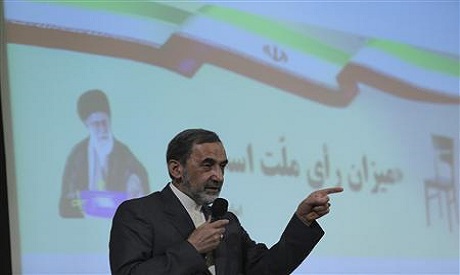
Ali Akbar Velayati, the foreign policy advisor to Iran's Supreme Guide Ali Khomeini (Photo: Reuters)
Ali Akbar Velayati, the foreign policy advisor to Iran's Supreme Guide Ali Khomeini, said Thursday during a meeting with an Egyptian popular diplomacy delegation that the Iranian revolution in 1979 had had an impact on Egypt's 2011 uprising.
The Egyptian diplomatic mission, initiated by the Cairo-based Arab Union to Support Resistance and in coordination with the National Association for Change, arrived in Tehran on Tuesday.
According to state-run MENA agency, the advisor praised the late Egyptian popular president Gamal Abdel-Nasser, whose words "impacted people from the Atlantic to the Indian Ocean."
Overtures to revive and boost Iranian-Egyptian diplomatic relations, especially on the technological and scientific fronts, were welcomed by the Egyptian delegation.
Former president Mohamed Morsi's policy of building closer relations with Iran, including steps to encourage Iranian tourists to visit Egypt, caused tensions in Egypt earlier in the year.
Salah El-Dessouki, head of the Egyptian delegation, highlighted the historical link between Egypt and Iran and called for it to be strengthened by a "strong relationship" between the peoples of both countries. He also stated that the efforts of the 2011 uprising were being dampened by counter-revolutionary currents.
"The enemy is prompted to call what happened in Egypt on 30 June a coup, while we call it a correctional revolution that is meant to achieve the people’s will. The support of the armed forces prevented a civil war," he added.
Morsi was ousted from the presidency in July, following mass protests on 30 June against his rule.
Political science professor Mohammed Idriss claimed that the 30 June protests broke up a strategic alliance between the US and Morsi's Muslim Brotherhood.
"It is known that the Brotherhood allied with the Americans and Hamas to create a strategic alliance in the Middle East made up of Turkey, Hamas and Qatar, its sole purpose to protect Israeli interests. It created and pitted a Sunni crescent made up of Morocco, Tunisia, Egypt, Libya against the so-called Shia crescent of Iran, Iraq, Syria and Hezbollah," he said.
According to Idriss, Iran has falsely invested its hopes in the Brotherhood for the fulfillment of an Islamic revolution in Egypt.
Diplomatic ties between Egypt and Iran were originally broken off in 1980, a year after Iran's Islamic revolution and Egypt's peace treaty with Israel.
Short link: